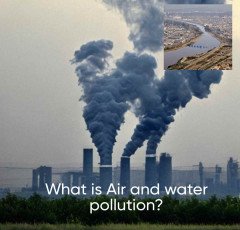
What is Air and water pollution ?

When dangerous compounds are present in the air we breathe, it is said to be polluted.
In addition to being produced by human activities like the combustion of fossil fuels, industrial operations, and transportation, these compounds can also originate from natural sources like dust and volcanic activity. Numerous harmful effects of air pollution on human health, such as cancer, heart disease, and respiratory issues, are possible.
When dangerous compounds are found in water bodies like rivers, lakes, and seas, it is said to be polluted.
These pollutants can originate from various processes in industry, agricultural runoff, sewage discharge, and oil spills, among others. Water pollution can have negative effects on ecosystems and aquatic life, as well as making water hazardous for human consumption. Serious health issues including diarrhea and other watery illnesses might result from this.
There are numerous contaminants that can contaminate the air and water. Carbon monoxide, nitrogen oxides, sulfur dioxide, particulate matter, and ozone are a few examples of typical air pollutants. Depending on their concentration and length of exposure, these pollutants can have negative impacts on human health in the short- and long-term.
Chemicals, organic and inorganic substances, as well as microbes, can all be pollutants of water. When consumed, these contaminants pose a risk to human health since they can destroy aquatic life and build up in the food chain.
There are several steps that may be taken to prevent air and water pollution, including cutting back on the use of fossil fuels, supporting clean energy sources, improving industrial processes, cutting waste and encouraging correct disposal techniques, and treating wastewater before releasing it into bodies of water. To prevent pollution and safeguard the environment and the general public's health, it is crucial for people, communities, and governments to take action.
Pollution of the air and water affects more than just the environment and people's health.
They may also have an effect on the economy. For instance, sectors like fisheries and tourism that depend on clean water may be impacted by water contamination. Similar to how it can increase healthcare expenditures, air pollution can reduce productivity because of sickness and absence.
Therefore, lowering pollution can have positive effects on the economy in addition to enhancing public health and protecting the environment. It can encourage sustainable development and help accomplish the Sustainable Development Goals set forth by the UN.
Major environmental issues like air and water pollution have an impact on everyone's health, the environment, and the economy. Collective action is crucial for reducing pollution and advancing sustainable development.
The effects of air and water pollution on health are diverse.
For instance, air pollution can result in cardiovascular disorders like heart attacks and stroke as well as respiratory issues like asthma and chronic obstructive pulmonary disease (COPD). Lung cancer risk can also rise with prolonged exposure to some air contaminants.
Water contamination can have detrimental consequences on one's health, especially in underdeveloped nations where access to clean drinking water is scarce. Typhoid fever and cholera are two waterborne illnesses that pose serious health hazards in regions with poor sanitation and tainted water supplies.
Air and water pollution can have an impact not just on human health but also on ecosystems and wildlife.
For instance, air pollution damages both plants and animals, while acid rain harms forests and aquatic ecosystems. In addition to harming aquatic life, water pollution can also reduce the richness of aquatic habitats.
Water and air pollution are important environmental issues that have a wide range of negative effects on ecosystems, the economy, and human health. To promote sustainable development and safeguard the environment for future generations, pollution reduction calls for concerted effort by individuals, communities, and governments.
To combat air and water pollution, numerous laws and policies have been put in place.
For instance, several nations have set emission caps for businesses and automobiles as well as requirements for air quality. To lessen reliance on fossil fuels, governments can also encourage the development of alternative energy sources like solar and wind power.
Similar to this, laws are in place to restrict the contaminants that can be dumped into waterways and to encourage people to use wastewater treatment facilities. To reduce agricultural runoff and improve the sustainable use of water resources, governments should also encourage the use of eco-friendly farming techniques.
Additionally, people can take action in their daily lives to lessen air and water pollution.
Air pollution can be decreased, for instance, by walking or taking public transit instead of operating a vehicle. Similar to this, conserving water at home and safely discarding hazardous garbage can help avoid water pollution.
It takes a team effort from individuals, communities, and governments to reduce air and water pollution. To solve these issues and encourage sustainable growth, policies and regulations must be continually created and put into effect.
Promoting public awareness and education is a crucial part of combating air and water pollution.
People can have a better understanding of how pollution affects their health and the environment through public education and awareness efforts, which will also increase their motivation to take action to minimize pollution.
In addition to encouraging sustainable development methods, schools and universities can be extremely important in educating students about the causes and impacts of air and water pollution. Similar to this, media sources can inform the public about pollution and its effects, as well as help to increase public awareness and inspire action.
To address the problems of global air and water pollution, international cooperation is also necessary. Numerous pollutants, like greenhouse gases, can have an influence on the entire world and must be addressed by all nations working together. Initiatives to reduce air and water pollution on a global scale can be supported and collaboration facilitated by the United Nations and other international organizations.
In order to effectively address air and water pollution, people, communities, governments, and international organizations must work together. We can collaborate internationally to preserve human health, the environment, and advance sustainable development through legislation and regulation, public education and awareness campaigns, and international cooperation.
More importantly, it should be noted that technical advancements can significantly contribute to lowering air and water pollution. For instance, the advancement of cleaner energy technology like electric cars and renewable energy sources can aid in the reduction of emissions from industry and transportation.
Similar to this, advances in water treatment and desalination technology can aid in ensuring that everyone has access to safe drinking water, especially in regions with a shortage of freshwater resources. Additionally, these technologies can support the sustainable use of water resources by lowering the amount of pollution that is released into water bodies.
Additionally, improvements in monitoring and data collection technologies can offer insightful information about the causes and trends of pollution, assisting researchers and politicians in coming up with more practical solutions to the problem.
Technology advancements can aid in reducing air and water pollution and advancing sustainable development when combined with legislation, rules, public awareness campaigns, and international cooperation. To address the environmental difficulties we confront, it is crucial to keep funding the research and development of innovative technologies and encouraging their adoption.
It is also important to remember that combating climate change is intimately related to reducing air and water pollution.
The release of greenhouse gases that contribute to climate change is mostly a result of the same human activities that pollute the air and water. Consequently, adopting steps to lessen pollution can also aid in reducing the effects of climate change.
Promoting the use of renewable energy sources and energy-saving techniques can lower greenhouse gas emissions as well as air pollution. Similar to how encouraging sustainable land use practices and lessening deforestation can enhance water quality, minimize soil erosion, and lessen carbon dioxide emissions into the sky.
Additionally, mitigating climate change and water and air pollution can have additional advantages.
Promoting walking or using the bus instead of driving, for instance, can reduce air pollution, as well as greenhouse gas emissions and encourage physical exercise.
Acting to solve both issues can have major added benefits.
Reducing air and water pollution is intimately related to combating climate change. It is crucial to keep striving for a sustainable future that safeguards the environment, fosters economic development, and preserves human health.
Must acknowledge that combating air and water pollution is a social justice issue in addition to an environmental one.
Marginalized groups like low-income areas and communities of color frequently suffer disproportionately from the effects of pollution.
These areas frequently lack access to clean water and air, and thus are more prone to have health issues brought on by pollution. As a result, combating air and water pollution necessitates a dedication to social justice and making sure that every person and community has access to clean and healthy settings.
In order to effectively address air and water pollution, people, communities, governments, and international organizations must work together. Addressing these issues requires a dedication to sustainability, social justice, and advancing the welfare of both present and future generations.
In conclusion, air and water pollution pose serious threats to the environment and have a negative effect on economic growth, environmental protection, and human health. Collective action from people, communities, governments, and international organizations is necessary to address these difficulties.
Policy and legislation, technology advancements, public awareness and education, global collaboration, and a dedication to sustainability and social justice are all necessary components of effective solutions to air and water pollution. Together, we can improve public health, lower pollution, lessen the effects of climate change, and build a sustainable future for everybody.
To emphasize that people may be very influential in tackling air and water pollution.
Small lifestyle adjustments like cutting back on electricity use, using the bus or carpooling, limiting plastic trash, and conserving water can make a big difference in lowering pollution.
People can support companies that promote sustainability and lowering pollution and lobby for changes in regulation. Supporting sustainable food production methods, ecologically friendly products, and renewable energy efforts can also aid in lowering pollution levels and advancing sustainability.
Individuals can be encouraged to make educated decisions and take action to minimize pollution by educating themselves on the effects of pollution and the value of sustainability.
While combating air and water pollution is a difficult task that calls for group effort, individuals can also make a significant contribution to lowering pollution and advancing sustainability. We can work toward a cleaner, healthier, and more sustainable future by making little changes and advocating for bigger ones.
The requirement for international cooperation is another crucial component of combating air and water pollution.
National borders are no barrier to the effects that air and water pollution can have; they can affect nearby nations as well as the entire world. As a result, it is crucial that the entire world community come together to confront these issues.
There are several ways that nations can cooperate internationally, including through exchanging information and best practices, working together on research and development projects, and enacting common laws and regulations. International environmental accords like the Paris Agreement on climate change, the World Health Organization, and other organizations play a crucial role in fostering international collaboration to address environmental concerns.
Furthermore, considering that many developing nations are disproportionately affected by pollution and have little funding to address these issues, wealthier nations have a duty to assist poorer nations in combating air and water pollution. To promote the creation and application of sustainable development initiatives, this may entail offering financial and technical help.
International cooperation and a dedication to tackling these issues globally are required to combat air and water pollution. Together, we can advance sustainable development, safeguard human health, and make the world a cleaner, healthier place for everyone.
To understand that managing air and water pollution is a task on both an economic and an environmental level.
The long-term costs of pollution, which include health care expenses, environmental remediation costs, and economic effects from harm to natural resources and ecosystems, can be substantial despite the fact that it sometimes has short-term economic advantages.
Contrarily, making investments in sustainable development and lowering pollution can have long-term economic advantages, including the creation of jobs in the renewable energy sector, a decline in health care expenses, and higher productivity due to a more productive workforce.
The Sustainable Development Goals (SDGs) of the United Nations, such as eradicating poverty, expanding access to clean water and sanitation, and fostering sustainable cities and communities, can all be achieved with the help of pollution reduction.
In addition to being a problem for the environment and human health, air and water pollution also has a financial cost. We can encourage economic progress, safeguard human health, and build a cleaner, more sustainable future for all by making investments in sustainable development and lowering pollution.
Air and water pollution pose serious environmental problems with wide-ranging effects on public health, the environment, and economic growth. Collective action from people, communities, governments, and international organizations is necessary to address these difficulties.
Policy and legislation, technology advancements, public awareness and education, global collaboration, and a dedication to sustainability and social justice are all necessary components of solutions to air and water pollution. Additionally, people may significantly reduce pollution by making simple lifestyle adjustments, advocating for causes they care about, and assisting sustainable enterprises and endeavors.
Since pollution knows no national boundaries, combating it also necessitates international cooperation. It is the duty of developed nations to assist developing nations in combating pollution and advancing sustainable development.
In addition to being a problem for the environment and human health, air and water pollution also has a financial cost.
Achieving the Sustainable Development Goals of the United Nations can be facilitated by making investments in sustainable development and lowering pollution.
Together, we can combat air and water pollution and advance a future that is healthier, cleaner, and more sustainable for everybody.

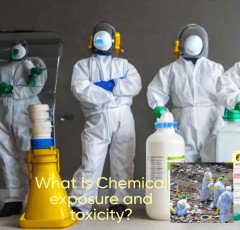
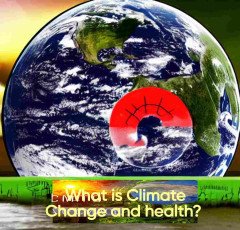

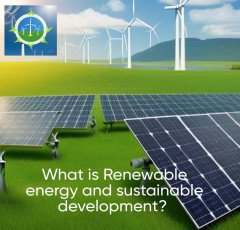
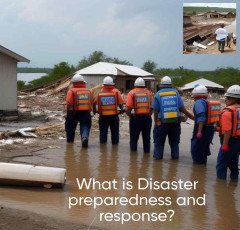

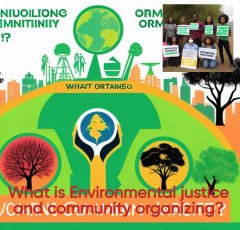
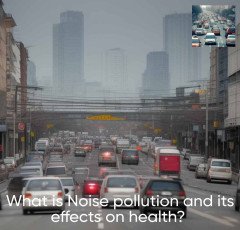


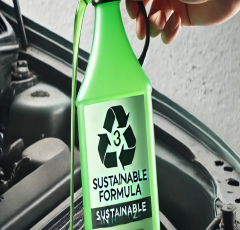






 The Secret Email System
The Secret Email System  NordVPN
NordVPN  Graphics & Design
Graphics & Design  The Click Engine
The Click Engine  Artificial Intelligence
Artificial Intelligence  Best Selling Books
Best Selling Books  ASUS Laptop
ASUS Laptop  SOFAS
SOFAS  Sennheiser
Sennheiser  ELECTRONIC ACCESSORIES
ELECTRONIC ACCESSORIES  Only For The United States
Only For The United States  One World Collection
One World Collection  Online Technology Classes
Online Technology Classes  Best Home Appliances
Best Home Appliances  Best Sellers On Amazon
Best Sellers On Amazon  Unlimited access to classes on illustration, photography, design, film, music
Unlimited access to classes on illustration, photography, design, film, music  NordLocker
NordLocker  Men Clothing
Men Clothing  Hot Bags For Pain Relief
Hot Bags For Pain Relief  Women Fashion
Women Fashion  Online Marketing
Online Marketing  Amazon Best Selling Products
Amazon Best Selling Products  Creative Brief For Video Shoot
Creative Brief For Video Shoot  Best Robotic Vacuum Cleaners
Best Robotic Vacuum Cleaners  Acer Laptop
Acer Laptop  RPM 3.0
RPM 3.0  Hello Theme
Hello Theme  All Wireless Products
All Wireless Products  Unreal Engine 5 For Beginners Learn The Basics Of Virtual Production
Unreal Engine 5 For Beginners Learn The Basics Of Virtual Production  Smart Doorbell
Smart Doorbell  ASPINAL LONDON
ASPINAL LONDON  SEO Checklist
SEO Checklist  1150+Trendy kids coloring pages Bundle
1150+Trendy kids coloring pages Bundle  Favorite Company (Cuelinks)
Favorite Company (Cuelinks)  Top Rated From Amazon
Top Rated From Amazon  TitTok Revolution
TitTok Revolution  BEST SELLER TOP10
BEST SELLER TOP10  NordPass
NordPass 
















